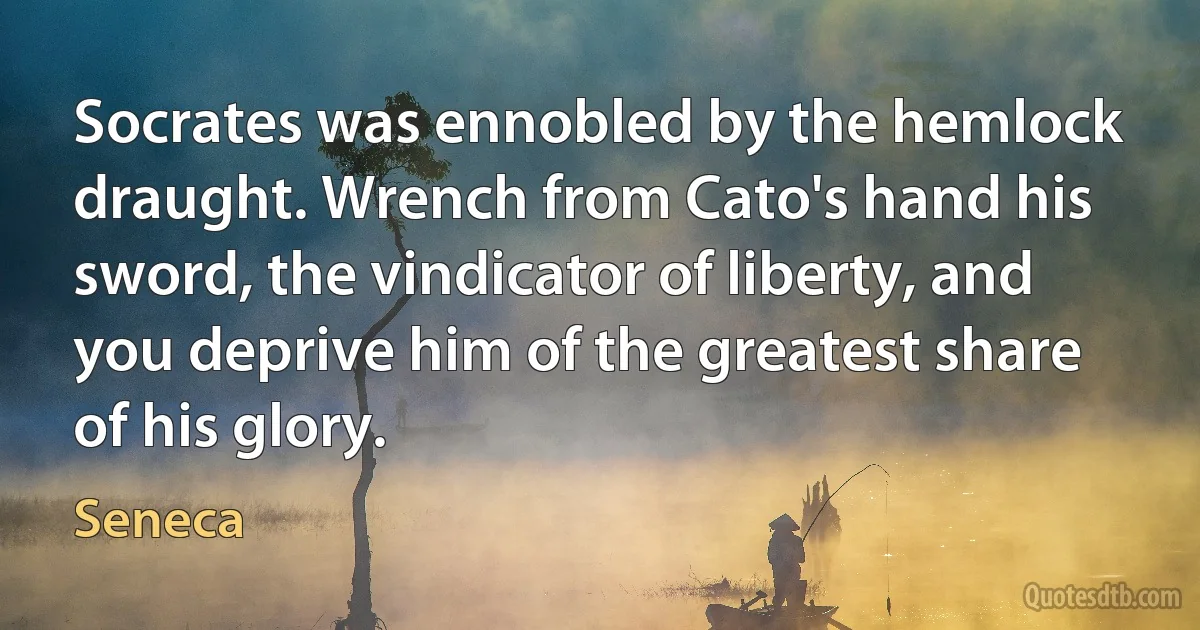Sword Quotes - page 7
"Treading" does not simply mean treading with the feet. Tread with the body, tread with the spirit, and, of course, tread and cut with the long sword. You must achieve the spirit of not allowing the enemy to attack a second time. This is the spirit of forestalling in every sense. Once at the enemy, you should not aspire just to strike him, but to cling after the attack. You must study this deeply.

Miyamoto Musashi
Some of the world's strategists are concerned only with sword fencing, and limit their training to flourishing the long sword and carriage of the body. But is dexterity alone sufficient to win? This is not the essence of the Way.
I have recorded the unsatisfactory points of other schools one by one in this book.

Miyamoto Musashi
He saw in a vision his eldest son (then a child and at London) appear unto him with the mark of a bloody cross on his forehead, as if it had been cutted with a sword, at which amazed he prayed unto God, and in the morning he came to Mr. Camden's chamber to tell him, who persuaded him it was but an apprehension of his fantasy at which he should not be disjected; in the meantime comes there letters from his wife of the death of that boy in the plague. He appeared to him (he said) of a manly shape, and of that growth that he thinks he shall be at the resurrection.

Ben Jonson
Oh! my brother Musalmans! I again remind you that you have ruled nations, and have for centuries held different countries in your grasp. For seven hundred years in India you have had Imperial sway. You know what it is to rule.”... "Our nation is of the blood of those who made not only Arabia, but Asia and Europe, to tremble. It is our nation which conquered with its sword the whole of India, although its peoples were all of one religion.

Syed Ahmed Khan
What kind of parent would want their children to have servants?" he asks, disgusted by the idea. "The moment a child thinks it is entitled to anything, they think they deserve everything. Why do you think the Core is such a Babylon? Because it's never been told no.
"Look at the Institute you attended. Sexual slavery, murder, cannibalism of fellow Golds?" He shakes his head. "Barbaric. It's not what the Ancestors intended. But the Coreworlders are so desensitized to violence they've forgotten it's to have a purpose. Violence is a tool. It is meant to shock. To change. Instead, they normalize and celebrate it. And create a culture of exploitation where they are so entitled to sex and power that when they are told no, they pull a sword and do as they like.

Pierce Brown
Nancy and I were married in January 1918 at St. James's Church, Piccadilly, she being just eighteen, and I twenty-two. George Mallory acted as the best man. Nancy had read the marriage-service for the first time that morning, and been so disgusted that she all but refused to go through with the wedding, though I had arranged for the ceremony to be modified and reduced to the shortest possible form. Another caricature scene to look back on: myself striding up the red carpet, wearing field-boots, spurs and sword; Nancy meeting me in a blue-check silk wedding-dress, utterly furious; packed benches on either side of the church, full of relatives; aunts using handkerchiefs; the choir boys out of tune; Nancy savagely muttering the responses, myself shouting them in a parade-ground voice.

Robert Graves
Are you going to offer yourselves here to the weapons of the enemy, undefended, unavenged? Why is it then you have arms? And why have you undertaken an offensive war? You who are ever turbulent in peace, and laggard in war. What hopes have you in standing here? Do you expect that some god will protect you and bear you hence? A way is to be made with the sword. Come you, who wish to behold your homes, your parents, your wives, and your children; follow me in the way in which you shall see me lead you on. It is not a wall or rampart that blocks your path, but armed men like yourselves. Their equals in courage, you are their superiors by force of necessity, which is the last and greatest weapon.

Livy
Arus saw a tall powerfully built youth, naked but for a loin-cloth, and sandals strapped high about his ankles. His skin was burned brown as by the suns of the wastelands and Arus glanced nervously at his broad shoulders, massive chest and heavy arms, A single look at the moody, broad-browed features told the watchman the man was no Nemedian. From under a mop of unruly black hair smoldered a pair of dangerous blue eyes. A long sword hung in a leather scabbard at his girdle.

Robert E. Howard
Philip Kaufman's Twisted walks like a thriller and talks like a thriller, but it squawks like a turkey.
But back to deus ex machina. This is a phrase you will want to study and master, not merely to amaze friends during long bus journeys but because it so perfectly describes what otherwise might take you thousands of words. Imagine a play on a stage. The hero is in a fix. The dragon is breathing fire, his sword is broken, his leg is broken, his spirit is broken, and the playwright's imagination is broken. Suddenly there is the offstage noise of the grinding of gears, and invisible machinery lowers a god onto the stage, who slays the dragon, heals the hero, and fires the playwright. He is the "god from the machine."

Roger Ebert



